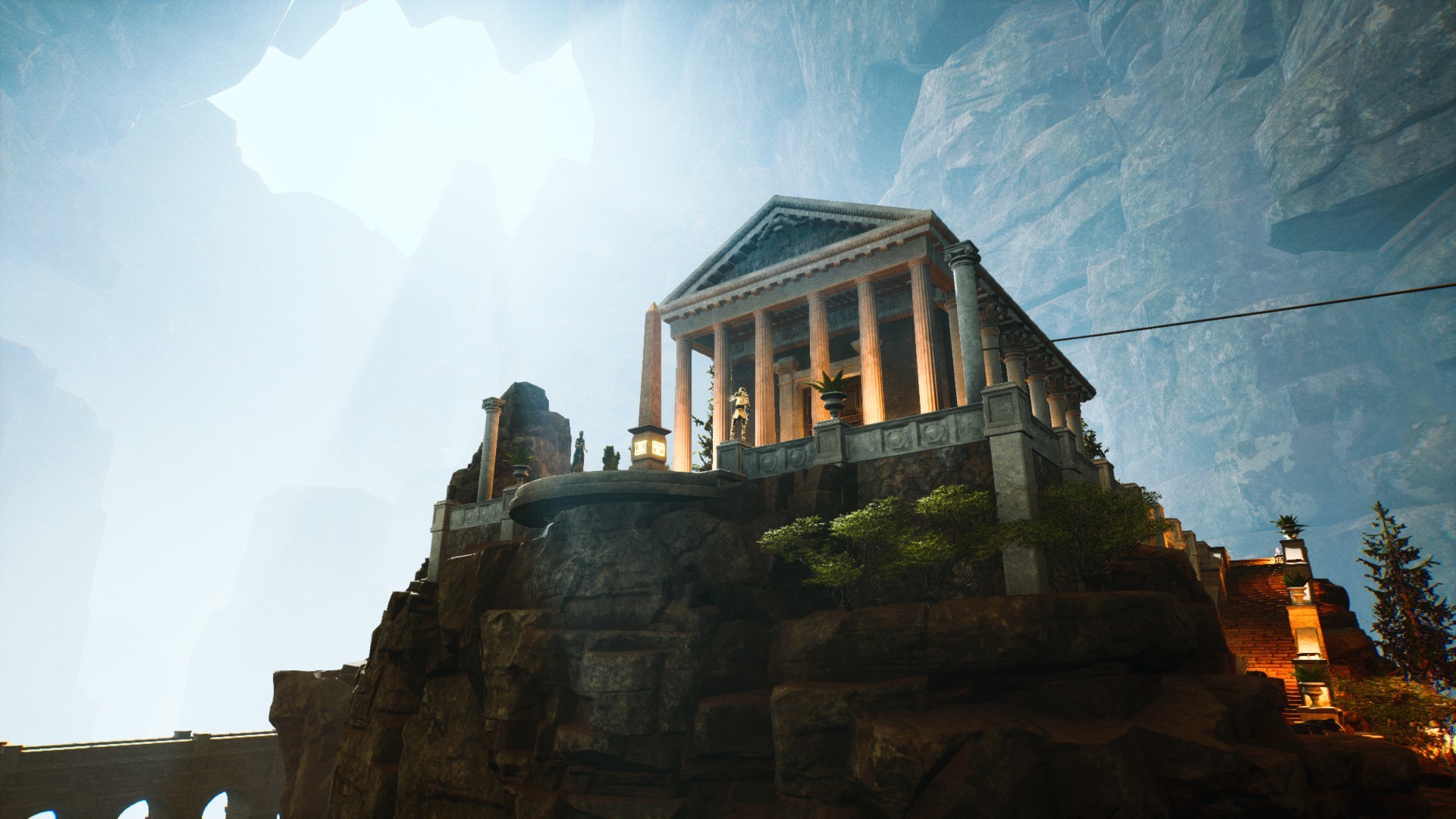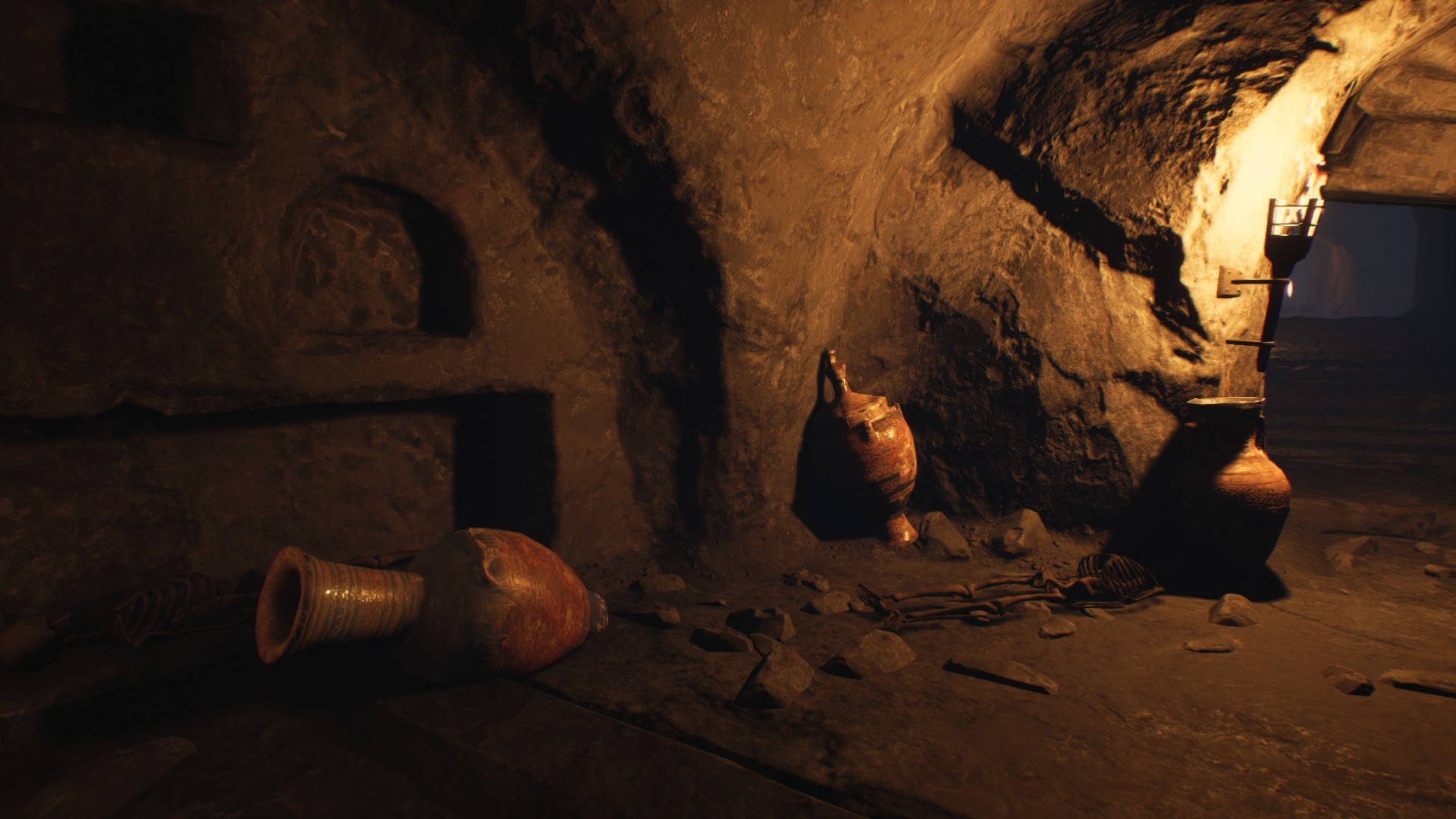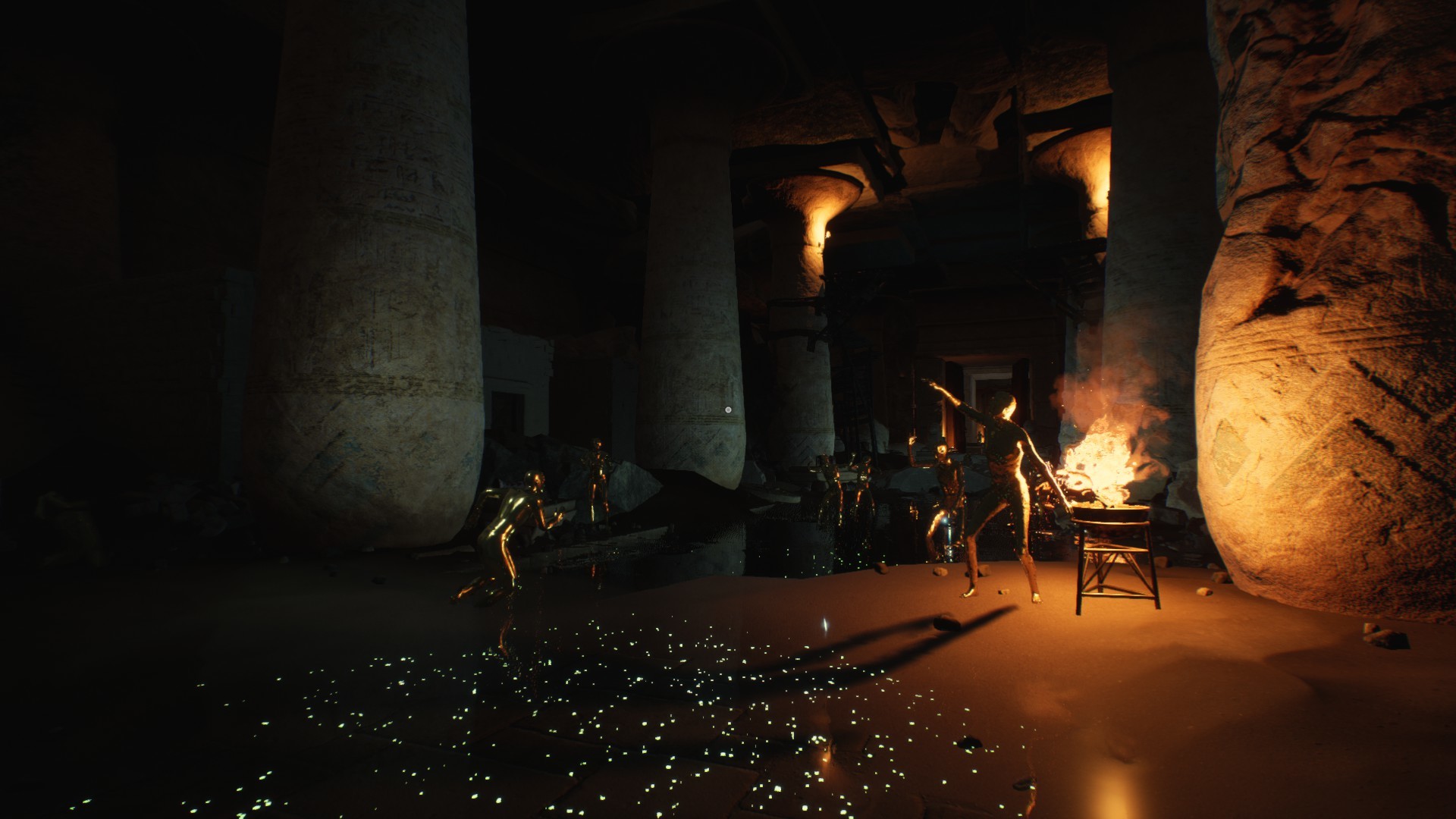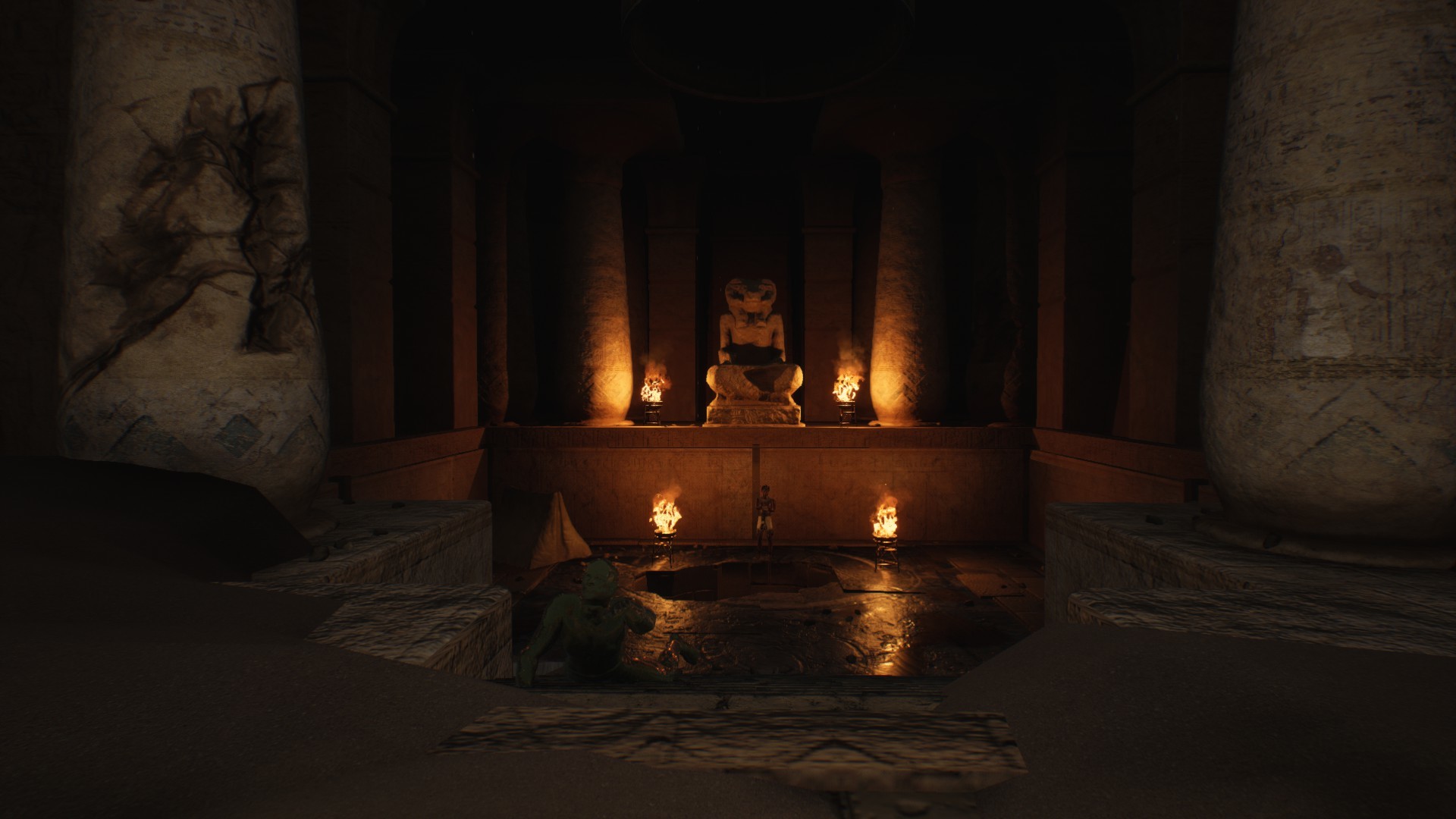Work Text:
When I watched J's playthrough of The Forgotten City, one of my early and recurring complaints was about the accents. Foreign characters like the Greek and the Babylonian have corresponding foreign accents (of varying quality)—but the Romans? The Romans sound unmistakably British, and I objected to that on both historical and political grounds. However, after seeing the game through to the end, I've realized these accents also represent a missed opportunity to tie into one of the game's key themes.
Note to explain what I'm getting at, I have to get into spoiler territory. If you're interested in The Forgotten City or its story, I would recommend playing the game or watching someone else's playthrough first before reading any further.
My initial reaction the English accents on Roman characters was one of annoyance, not just because it's cliché, but because of what it represents. If the Romans need to speak English with a modern accent for the sake of anglophone players, then I say don't be a coward: make them sound Italian. Giving them English accents instead flatters the counterhistorical view of the English as somehow the natural heir to the Roman Empire, with a seamless line of cultural succession between them—an outlook embraced by white supremacists enamored with Rome as a symbol of European imperial power. I am of course aware that Roman characters with English accents are an established trope in fiction, but it's an established trope for exactly that reason. To a modern viewer, the English are a historically recent touchstone for representing empire. I remember being taught the phrase "The sun never sets on the British Empire" before I was even old enough to grasp what it meant—that there is no westernmost point to empire that spans the globe.
Theoretically I could have written a post about just that accent trope alone. Instead, though, I want to try and give you a glimpse of what this game is like to experience and the missed opportunity that these accents represent. Get out your shovel with me. We need to dig deeper.
Imperialism is an inescapable aspect of The Forgotten City's narrative, although it may not seem that way at first. The Ancient Roman Empire provides a setting and historical worldbuilding for the game, but much of this is flavor text, not substantive to the plot. The real mystery is how to break the curse. You as the player have been thrown back in time from the modern day, and each time someone triggers the curse that turns everyone into gold, you need to return to the start of the loop and try again. And yeah, sure, there's sidequests involving debt slavery and a magistrate election, but those aren't the star of the show, are they? The Romanness of the setting is peripheral. All the way up until it's not.

At a thematic level The Forgotten City is making an argument about the nature of empire. Gradually, at first, in dialogue, and then more and more, with overt physical symbolism, the game hits you with this recurring idea: empire is a palimpsest.
A palimpsest, for those who don't know, is a piece of parchment or paper that has already been written on, then washed or scraped to erase what came before so it can be used again. "Palimpsest" can also be used metaphorically to describe an object's reuse or layering of uses. For instance, architectural palimpsest can involve modern architecture built over or into more historical buildings. So when we call something a palimpsest, we're not just talking about recycling materials—we're talking about remnants of the past being used as the foundation for the present, building over what came before.
The first character to broach this idea in the game is the character of Georgios, a Greek. He's considered a "foreigner" in this city, and he relates to you, the player, as a fellow foreigner. The moment you ask him about where to find a certain Greek artifact, he starts complaining to you about the Romans and their practice of slapping new Latinized names onto everyone.
My name is Georgios, yes? But the Romans, they do not care. They hear me say, "Georgios," and they think "Ah, he must mean Georgius." Good Roman name. They do this all the time! They see us worshiping Zeus, they copy us but call him Jupiter. They take Hades, and call him Pluto. Persephone? Proserpina. I am flattered that they copy our ideas, but why must they change the names? Do they want credit for making it all up? Do they want to forget where it came from? [...] But my point is this: If you want to know who stole an old Greek name, look no further than the sticky-fingered Romans. The plaque you seek was pilfered from a collection of old Greek relics by none other than Duli. He cannot help it; like a typical Roman, he likes shiny things, especially those that once belonged to my people.
This cultural appropriation may be unremarkable to a modern player, and it may even seem unimportant at first. Yeah, sure, the Romans write over the Greeks. Neat metaphor, right?
It's not just a metaphor.
In The Forgotten City, the Roman city is literally built on top of a Greek one. You don't realize this at first, running around on the surface and seeing all the Roman buildings touched by sunlight. Eventually, though, you're able to descend from the surface to discover the cavernous ruins of an older city, a Greek city, buried underground.

That's interesting, but the quest that brought you here is a search for a missing person, and he isn't here. You need to keep looking.
So you press on, descend to a deeper level, and open the doors to another area, where the ground turns sandy and the columns look strangely... Egyptian.

All this time, I thought "the forgotten city" meant the Roman one on the surface, the one you discovered in modern times before being sent back to the past. I didn't realize that the Roman characters, too, had forgotten. Their version of the city is just one permutation, the most recent layer, built over the Greeks, who built over the Egyptians. It's here on this third Egyptian layer that you'll find a man named Khabash, who laments to you how the Greeks copied from and built over his people.
This discovery isn't incidental—it's indispensable to winning the game. You cannot find what you need solely at the level of the Roman settlement. You need to connect the dots cross-culturally and figure out what it means about who's responsible for the curse.
The approach here may strike those familiar with the corresponding cultures as reductive, and it is, but giving an anthropologically precise history lesson isn't the point. The point is that in order to break the curse over the city, you have to realize that mythologies build on other mythologies. Cultures overwrite other cultures. Empire is a palimpsest.
In the process of writing this post, I learned that the whole notion of "the sun never sets on the [X] Empire" is, itself, ancient. It has been used for the British, Spanish, Austrian, Roman, Persian, Egyptian, and Mesopotamian Empires. Again and again it's scraped and written over as empires rise and fall.

So, alright, back to those English accents.
If it were up to me, I'd have inserted some kind of line of dialogue about them. You as the player already have the option to express surprise when Latin dialogue is magically translated for you. Why not stick in some remark about the Romans sounding like they're from England, as well? Drawing this kind of connection to the present could have enriched the game's themes on the subject of successive empires. Imagine if you could even have a conversation about what the ancient Romans think of the Britons in their time, as contrasted with how the English speak of the Romans now.
I don't want to spoil every plot twist in The Forgotten City for you, which is why I cut off my plot summary where I did (and those of you who know the story, please refrain from additional spoilers in the comments). Regardless of what you think of the actual ending or the rest of the game (which does get quite silly at times), I found the layered-culture aspect of the premise genuinely striking in its execution. It's an interesting plot device. To be honest, though, half of the impact is a credit to the lighting and atmosphere. There's just nothing quite like that sense of excavation, descending down into the earth and discovering, by torchlight, something ancient and forgotten.
